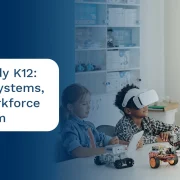Unlock the keys to learner-centric assessments in this infographic. Discover strategies like personalized feedback, self-assessment, and competency-based evaluation. Tailor assessments to individual learner needs and preferences for enhanced engagement and outcomes. Transform SME assessment with Hurix Digital. Prioritize learner success today!

Understanding SME Assessment
Assessments for Subject Matter Experts (SMEs) are crucial for measuring competencies that impact business outcomes. These evaluations help organizations identify strengths and areas for improvement, ensuring SMEs contribute effectively.
Strategic Alignment in Assessments
Aligning assessments with organizational goals is essential. When assessments reflect company objectives, they provide relevant insights. This alignment ensures focus on skills that drive performance and meet strategic targets.
- Key actions include:
- Identifying company goals.
- Designing assessments for relevant skills.
- Regularly reviewing alignment to adapt to business needs.
Targeted Skill Evaluation
Assessing specific skills vital for SME success is crucial. This targeted approach identifies knowledge gaps, allowing for tailored training programs.
- Consider incorporating:
- Customized skill assessments.
- Benchmarking against industry standards.
- Feedback mechanisms to refine criteria.
Real-world Application of Assessments
Assessments should mirror real-world scenarios SMEs face. Practical applications evaluate how well SMEs transfer knowledge into practice.
- Effective strategies include:
- Case studies reflecting industry challenges.
- Simulations replicating job functions.
- Peer assessments for varied perspectives.
Continuous Improvement of Assessments
Assessments must adapt based on feedback and trends. Continuous improvement ensures tools evolve with workplace skills.
- Implementing enhancements involves:
- Gathering feedback post-assessment.
- Staying updated on best practices.
- Adjusting assessments for new technologies.
Engaging and User-friendly Assessments
Engaging assessments are imperative for effective evaluation. User-friendly formats encourage participation, leading to accurate results.
- Consider the following:
- Interactive assessments with multimedia.
- Clear instructions and accessible formats.
- Incentives for participation to boost engagement.
Conclusion
Effective SME assessment rely on strategic alignment, targeted evaluation, practical application, continuous improvement, and user engagement. Focusing on these elements ensures meaningful insights that support growth.




